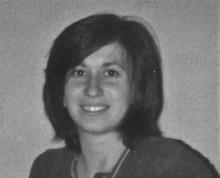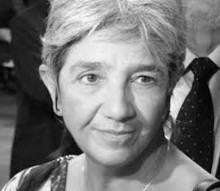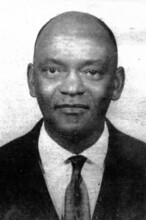Ficha de víctima #757




Carta de Jan Rocha de Clamor (Comité de Defensa de Derechos Humanos para los países del Cono Sur) a Jair Krischke, presidente de MJDH relativa a la desaparición de Jorge Adur (capellán de Montoneros) en junio de 1980. Rocha pide a Krischke, cuya organización se encuentra más cerca de la frontera entre Argentina y Brasil, si pueden realizar una búsqueda junto a la policía de frontera para ver si Adur efectivamente entró al territorio brasileño.
This report is addressed to the head delegate Dr. Silvio Pereira Machado. The unknown writer of this correspondence recounts that, on 15th April 1977, he or she accompanied two Argentine Federal Police officers to a meeting with the Colonel Felix de Souza in São Paulo under the request of the Argentine consul Julio Alfredo Freixas. The Argentine police asked for two Argentine citizens to be arrested while they were living in São Paulo.
This letter is composed of two parts. The head of the Foreigners’ Specialized Branch of São Paulo Police (Brazil), Homero Honorio Ferreira, writes to the general director of São Paulo Police, Lucio Vieria. Ferreira forwards a receipt to Vieria that he had received from the Argentine police at the Iguazú Police Precinct when they seized four Argentine citizens who were living undercover in Brazil. The Argentines were handed over by the Brazilian police and held at the police station while their records were being investigated.
This document is composed of three parts. The first of which is a note from the Permanent Mission of Uruguay before the Organization of American States (O.A.S.) dated April 1981.The note is sending the Ministry of Foreign Affairs in Montevideo a copy of an article written by the Inter-American Commission of Human Rights in relation to Case No.4529. The second part is a note dated December 1980 containing the observations of the claimant of Case No.4529 (Celiberti and family).
This report explains the attempts by numerous Argentine and Brazilian agents to arrest two Argentine women in the Brazilian city of Uruguaiana bordering Argentina. Although the names are crossed out, it is possible to tell from the dates and mentioned places that the cases refer to Cristina Fiori (whose name has not been crossed out towards the end of the document) and Margarita Mengol. Fiori was detained in an operation by several Uruguayan civil police agents and one Argentine police officer on 17th November.
The report records that, between 16th and 20th December 1977, the guerrilla group Montoneros held a meeting in Santos city situated in the Brazilian state of São Paulo. During this meeting, they discussed the operations to be carried out during the World Cup in Argentina. The Montoneros organisation is going to ramp up its operations during the World Cup, aiming to hijack the radio and television transmissions to spread messages against the Argentine government. The report is not signed.
The document recounts that Leonel Brizola and his companions did not embark on the Braniff flight to New York as originally planned. Rather, they later travelled on the flight no. 300 operated by Aerolíneas Argentinas which covers the Buenos Aires- New York route, without the normal layover. The telegram is from Cláudio Garcia de Souza, Brazilian Ambassador to Argentina.
This document records information about the governor of Brazil’s Rio Grande do Sul state, Leonel Brizola that the military attaché had received from the Uruguayan Secretaría de Informaciones de Estado (State Information Secretariat, SIDE). Since his arrival in Buenos Aires, Leonel had been staying in an apartment on Uruguay Street. On the day that the telegram was sent, Brizola was due to leave the apartment for Buenos Aires’ Ezeiza International Airport, where he would take the 8pm flight to New York with various stopovers along the way.
The telegram writes that the governor of Brazil’s Rio Grande do Sul state, Leonel Brizola, arrived in Buenos Aires the previous night according to press reports. The military attaché is already in contact with the corresponding Argentine organisations to carry out the necessary arrangements. As soon as the requested information is received, it will be sent straight to the Ministry. The telegram comes from the Brazilian ambassador in Buenos Aires, Claúdio Garcia de Souza.
In this letter, the Chief of the DOPS, Sérgio Paranhos Fleury reiterates a previous request to the Argentine Consul in São Paolo. He asks for personal details such as the passport of Argentine citizen, Miguel Ángel Ricci, who at the time is being held at the DOPS detention centre in São Paolo. The letter is signed by Sérgio Paranhos Fleury, Chief of the DOPS.
The advising minister of the Brazilian Embassy in Buenos Aires in 1976, Marcos Camilo Cortes, reports that, former Brazilian president João Goulart’s coffin had crossed the international bridge to the Brazilian municipality of Uruguayaina and, from there, it would continue making its way to the Brazilian city of São Borja, according to the Brazilian consul in the Argentine city of Poso de los Libres. The consul added that everything had gone smoothly, including in Uruguayaina.
The advising minister of the Brazilian Embassy in Buenos Aires in 1976, Marcos Camilo Cortes, addresses the telegram to the Minister of Foreign Relations, notifying him of the arrival of former Brazilian president Goulart’s body to the Argentine city of Paso de los Libres. Cortes reports that the Brazilian consul in the city, Ney Faria, had confirmed that he had already actioned all the possible measures at his disposal but he wanted instructions from the Minister regarding the “delicate aspects of the case”.
The advisory minister of the Brazilian Embassy in Buenos Aires in 1976, Marco Camilo Cortes, addresses the telegram to the Minister of Foreign Relations to whom she sends information about the passing of former Brazilian president João Goulart. News received by the consul in the Argentine city of Paso de los Libres, Ney Faria, suggests that the former president died from a heart attack while he was in Argentina, near the locality of Mercedes.
This search request corresponds to two Argentine citizens, Ricardo Luiz Franco and Maria Catalina Benassi, who were accused of belonging to a subversive organisation called the Ejército Revolucionario del Pueblo (People’s Revolutionary Army, ERP). Franco and Benassi were both living in Porto Alegre (Brazil) at the time. The document asks for the two Argentines to be tracked down and arrested and for further relevant information to be shared.
This document contains a list of names of Argentine citizens who were being tracked down by the Argentine military and police authorities for having committed subversive acts. It requests that the said individuals must be immediately arrested and the agency must be informed of any citizens who are living in Brazil illegally. While those who are living in the country legally must be tracked down and kept under closed surveillance while the agency is being informed of their arrest.
This document is comprised of two parts. The first sheet is printed with the letterhead of Rio de Janeiro’s Serviço Nacional de Informações (National Information Service, SNI). It indicates that a list of subversive people wanted by the Uruguayan authorities is being sent to numerous Brazilian military agencies such as Rio de Janeiro’s Centro de Informações da Marinha (Navy Information Centre, CENIMAR) and Centro de Informações de Segurança da Aeroná (Aeronautics Safety Information Centre, CISA).
This document recounts that the Argentine Federal Police had completed an operation in hotels in Buenos Aires in order to seize weapons. In the Hotel Madrid, two Brazilians, one Bolivian, and a Uruguayan were arrested, all of whom were political exiles who had arrived from Chile through the Argentine Embassy. Appendix a) mentions other Brazilian citizens, specifically the former major Joaquim Pires Cerveira and João Batista Rita, who had supposedly been handed over to the Brazilian authorities.
This report states that the Brazilian private consulate in the Argentine city of Alvear had received a tip-off from the customs authorities at Brazil’s Itaqui Port that the Argentine Alberto Rosales had entered Brazilian territory via the port on 26th August 1974, travelling in a red car and accompanied by a woman. Rosales was on a wanted list in Argentina and had received a prison order, according to information provided by the customs authorities in Alvear. The document is unsigned.
In this document, the Brazilian Centro de Informações do Exterior (Centre of Foreign Information, CIEX) requests information about the Brazilian national Sydney José Marques in order to confirm if he is the same person as Sydney Marques, the member of the Brazilian Revolutionary Communist Party’s (Partido Comunista Revolucionário) leadership. It also requests any further information to help identify Sydney Marques. The letter is unsigned and only a stamp can be seen at the bottom.
This report recounts that one of Brizola’s relatives, João Calixto, took a three-day trip from Porto Alegre (Brazil) to Montevideo (Uruguay) to deliver a report about the military situation in Brazil. The report states that the former governor of Rio Grande do Sul state (southern Brazil) would be “inactive” from thereafter, considering that nothing more could be done in Brazil. Brizola was living in an estancia in the Uruguayan department of Durazno.
This document recounts that the Cuban Intelligence Directorate (G2) agent, Sonia Lafoz was having a romantic affair with the former Brazilian naval attaché, Joaquim Cerveira in Chile. He disclosed to Sonia that, after having received information about Edmur Camargo’s trip, he had contacted the aeronautic attaché in Buenos Aires, who was going to lead the operation to arrest Camargo. The news spread quickly among Brazilian exiles. Sonia managed to convince Cerveira to give her Camargo’s flight details.
This report recounts that Joaquim Pires Cerveira and other Brazilian exiles in Chile suspected that an aeronautics attaché in Buenos Aires was responsible for Edmur Camargo’s disappearance. Cerveira was able to get hold of copies of records from the airline LAN-Chile confirming that Camargo had been forced to get off the aeroplane signed by the pilot in Ezeiza. This information clarifies doubts as to whether Camargo was actually arrested. There is no signature and the document is stamped at the bottom.
This report records that Brazilian exiles in Chile were worried about the disappearance of Edmur Péricles Camargo. In response, they handed a document to the Chilean Interior Ministry recounting Camargo’s trajectory and his journey to Montevideo on 16th June 1971 for health reasons. Camargo was due to return on 10th July but he had not contacted any of his comrades, who had received information that he had been kidnapped by Argentine and Brazilian police agents and later handed over to the Brazilian authorities. There is no signature and only a stamp can be seen at the bottom.
This report records that the Brazilian exile Edmur Péricles Camargo, nicknamed “Gauchão”, travelled on the LAN No.153 flight from Santiago (Chile) to Montevideo (Uruguay). He was carrying three letters with him: the first, which was addressed to a Uruguayan doctor, was actually a communication between Brazilian exiles in Uruguay and the Tupamaros guerrilla organisation. Edmur had been told not to contact Leonel Brizola and his followers in Uruguay. There is no signature and only a stamp can be seen at the bottom.
This report recounts the operation that took place on 16th June 1971, leading to the detention and subsequent forced disappearance of the Brazilian exile Edmur Péricles Camargo. Argentine police officers forcibly dragged Camargo from a LAN-Chile plane, which had just arrived at Buenos Aires’ Ezeiza International Airport on a layover between Santiago (Chile) and Montevideo (Uruguay). A Brazilian Airforce (FAB) plane landed in Buenos Aires on 17th June and travelled to the Galeão Air Base in Rio (Brazil) with Camargo on board, escorted by Brazilian agents.
This report was originally written in the Brazilian Embassy in Uruguay. It analyses the situation of refugees and Brazilian exiles in Uruguay, which fall under three main boxes according to their legal status: 1) political asylum seekers, 2) refugees (political or not), and 3) permanent residents. Among the political exiles to receive asylum from the president of Uruguay were important figures such as João Goulart, Leonel Brizola, and Jefferson Cardim.
This report recounts the operation of the detention, torture, and imprisonment of the Brazilian exile Jefferson Cardim de Alencar Osario, along with his son, and his nephew, in Buenos Aires on 11th December 1970 and their arrival at Buenos Aires port from Colonia (Uruguay). The operation was coordinated and carried out by military attachés belonging to the Brazilian embassy in Buenos Aires and agents of the Coordinación Federal (Federal Coordination) of the Argentine Federal Police.